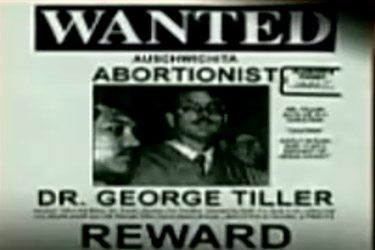Kansas Judge Hears Arguments in Wichita Clinic Stalking Case
The attorney of a pastor accused of handing out "wanted" posters for a Wichita clinic operator says the pastor is protected by the First Amendment.

On Tuesday, a Kansas judge heard arguments on whether to dismiss the case of a pastor accused of distributing “wanted“-style posters with the picture and home address of a Wichita abortion clinic operator, or make permanent an order under the state’s stalking law.
In March, Julie Burkhart, executive director of Trust Women, was awarded a temporary protection from stalking order against Mark Holick, the pastor of Spirit One Christian Ministries in Wichita. Burkhart’s attorneys have asked the court to make that order permanent, while Holick’s attorneys have asked the court to dismiss the case on constitutional grounds, arguing a permanent order would have an impermissible chilling effect on anti-abortion protester’s First Amendment rights.
According to the Wichita Eagle, in addition to distributing the “wanted” posters, Holick used a bullhorn during an anti-choice protest and pointed a sign at Burkhart’s house that said “Where’s your church?”—an apparent reference to the murder of Dr. George Tiller, who was killed while he was attending church. Holick is also accused of encouraging others to bring Burkhart to “eternal life.”
Holick’s attorney, Donald McKinney, argued that should the court make Burkhart’s order permanent it would have far-reaching implications, arguing restraining orders will be sought in every protest against any identifiable anti-choice protester. Holick’s poster and his comments, McKinney contends, are political and religious speech.
This is not the first time anti-choice activists have invoked the First Amendment as a way to try and justify their targeting of abortion providers in Wichita. McKinney also represents anti-choice activist Angel Dillard, who was charged under the Freedom of Access to Clinic Entrances (FACE) Act for sending threatening letters to Dr. Mila Means. Means is an abortion provider who at the time was training to offer abortion services after Dr. Tiller’s death. Earlier this year, a federal court ruled Dillard’s letter, which suggested Means would find explosives placed under her car should she provide abortions in Wichita, was not a “true threat” and therefore was protected under the First Amendment. The Department of Justice has decided to appeal that decision.
Dillard is also a known acquaintance of Dr. Tiller’s murderer, Scott Roeder. Roeder, who is serving a life sentence for Tiller’s murder, told Dillard in a recorded jailhouse call that reopening Tiller’s clinic “is almost like putting a target on your back.” That statement led prison officials to administratively charge Roeder with trying to intimidate Burkhart. When the Department of Justice tried to gain access to additional conversations between Dillard and Roeder, McKinney argued those conversations were protected because Dillard was “ministering” to Roeder.
Sedgwick County Judge James Beasley said he would rule in the next ten days on whether to make Burkhart’s order permanent or to dismiss the case.

